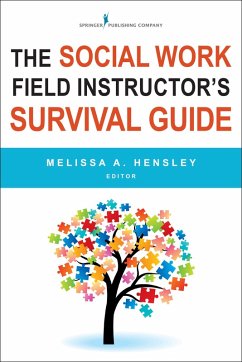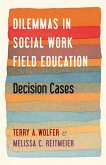Despite the critical role that community-based supervisors play in the training of social work students, there has been no comprehensive resource for core informationuntil now. This is a sage, practical guide for social work field instructors who want to provide expert guidance to their students in the field and in the classroom. It helps field educators to impart the knowledge, skills, and values of the social work profession and to assist students in translating classroom knowledge into effective practice in realworld settings. The book helps instructors to master the nuts and bolts of field education by delineating how to orient students to field work and supervision, monitor cases, evaluate student performance, navigate professional ethics, comply with CSWE practice competencies, and fulfill all requirements of a social work practicum.
The authors, who are seasoned social work practitioners and veteran field instructors, distill years of hard-earned wisdom regarding all components of the field education process. They describe how to recruit practicum students and facilitate positive collaboration between school and field agency. The chapters outline dos and don'ts of supervision, learning assessment planning and agendas, evaluation plans and techniques, how to integrate theory and practice, and how to best assist students who are struggling. Plentiful examples from social work programs and field agencies clearly illustrate the challenging process of providing field instruction to both graduate and undergraduate social work students.
KEY FEATURES:
The authors, who are seasoned social work practitioners and veteran field instructors, distill years of hard-earned wisdom regarding all components of the field education process. They describe how to recruit practicum students and facilitate positive collaboration between school and field agency. The chapters outline dos and don'ts of supervision, learning assessment planning and agendas, evaluation plans and techniques, how to integrate theory and practice, and how to best assist students who are struggling. Plentiful examples from social work programs and field agencies clearly illustrate the challenging process of providing field instruction to both graduate and undergraduate social work students.
KEY FEATURES:
- Provides comprehensive, practical guidance for all aspects of social work field education
- Includes helpful strategies regarding challenging aspects of field education
- Addresses student orientation, evaluation, professional ethics, supervision dos and don'ts, integrating theory and practice, and much more
- Guides field instructors in complying with CSWE practice competencies
- Helps field instructors clarify the expectations of a social work practicum and stay connected with their students' schools
Dieser Download kann aus rechtlichen Gründen nur mit Rechnungsadresse in A, D ausgeliefert werden.









